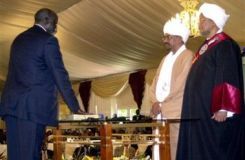SPLM leader becomes first vice president
KHARTOUM, July 9 (AFP) — Former rebel leader John Garang was sworn in as Sudan’s first vice president as a new power-sharing constitution came into force in a bid to put a final seal on two decades of civil war.

|
|
John Garang, left, is sworn in as first vice president of the republic in Khartoum,Saturday, July 9, 2005 as President Omar El-Bashir,center, and the chief justice Galal edd in Mohammed Osman, right look on. (AP) . |
Garang will also head an autonomous administration due to run the mainly Christian and animist south for a six-year interim period leading up to a promised referendum on independence.
“I, John Garang Demabior, swear by almighty God that as the first vice president of the Republic of the Sudan, I shall be faithful and bear true allegiance to the Republic of the Sudan,” he pledged Saturday, at an inauguration ceremony attended by a host of foreign dignitaries.
For the first time, posters of Garang were put up at the venue of the event at the republican palace in Khartoum where young men, women and children dressed in colorful costumes sang and danced in celebration.
His inauguration came after President Omar al-Beshir formally promulgated the new constitution, bringing to an end the state of emergency that has been in force on and off since he seized power in a 1989 coup and banned all political parties.
Former foes Beshir and Garang shook hands and embraced each other.
UN chief Kofi Annan hailed “a day of great hope for the Sudanese people, who have suffered so long.”
The civil war, which was Africa’s longest-running, left an estimated two million people dead and more than four million displaced before the signing of a landmark peace deal in Nairobi in January.
Annan also expressed concern about the potentially destabilizing effects of continued ethnic minority uprisings in Sudan’s western Darfur region, and Kassala and Red Sea states in the east.
“The peace process between north and south must be made irreversible, which it will not be unless it takes root in the east and in the west as well,” Annan said.
Both Garang and Beshir echoed his comments and vowed to work to restore security nationwide.
Peace will not be complete “as long as there is war in Darfur and eastern Sudan,” Garang said, pledging to work with Beshir to end the two conflicts “in the shortest time possible.”
The president promised to “deploy maximum efforts to put the peace accord to good use and install stability in Darfur.”
“Also in east, we will exert efforts with all opposition forces to reach stability and promote development,” Beshir said.
The government and the Darfur rebels signed a 17-point framework agreement in Nigeria’s capital on Tuesday but further rounds of talks will be necessary for a political settlement of the more than two-year-old conflict which has left as many as 300,000 people dead and 2.5 million more homeless.
Talks have yet to get under way in eastern Sudan where rebels from the Beja minority have been fighting the government since 1994 and control a strip of territory on the Eritrean border.
Arab League chief Amr Mussa, US Deputy Secretary of State Robert Zoellick and several regional heads of state, including the presidents of Kenya, Uganda, the Central African Republic, Djibouti, South Africa and Senegal also attended the inauguration.
The UN chief later joined Beshir, Second Vice President Osman Ali Taha and Garang, as they danced hand in hand with children to Sudanese music celebrating the event.
The Khartoum government’s Eritrean archfoe, President Isaias Afeworki, a key ally of Garang, did not attend but sent a message of congratulations.
Isaias expressed “pleasure for the people of Sudan for the implementation of the comprehensive peace agreement” and hope that they would find “strong founded comprehensive political solutions to all the unsolved issues in the Sudan.”
Annan later urged donor nations at a press conference to make good on their pledges to assist Sudan.
“It is extremely important that now that the Sudanese have come this far that the international community also honors the commitment that it has made to them in terms of recovery reconstruction as well as humanitarian assistance,” he said.
Donors pledged nearly 600 million dollars in hard cash last April in support of south Sudan’s reconstruction, but not all has been committed let alone disbursed.
Southern Sudan needs billions of dollars to rebuild its infrastructure after 21 years of war and has to grapple with the return of tens of thousands of refugees, poor harvests and the looming threat of famine.
